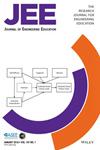Am I smart enough to be an engineer? How undergraduate engineering students articulate their identities
Abstract
Background
Students' identification with engineering is intertwined culturally with being smart. Broadly, engineering students are often considered to be smart by others and by themselves, and these beliefs about smartness—what it is and who has enough of it to be an engineer—are a fundamental and limiting aspect of students' experiences.
Purpose
The purpose of this study was to explore how undergraduate engineering students describe themselves as smart enough to be engineers. We aimed to develop rich descriptions of the complex ways they articulate their identities as smart before coming to college and during the first two years of their undergraduate degrees.
Design/Method
We collected data through a series of interviews with 25 participants. We iteratively and collaboratively analyzed the data to determine the predominant ways the participants articulated their identities as smart enough to be engineers. We generated a qualitative data display to check for patterns related to pathways into engineering programs and privileged social identities.
Results
We found that engineering students have three different ways to articulate that they are smart enough to be engineers: (1) they have innate abilities, (2) they are hardworking and dedicated to learning, and (3) they have skills and experience related to engineering. Additionally, we provide qualitative evidence that the innate abilities articulation relates to privilege.
Discussion/Conclusion
The study participants engaged in identity work that produced the three articulations. As engineering educators, we need to take responsibility for the ways in which our participation in the cultural practice of smartness reproduces inequity.


 求助内容:
求助内容: 应助结果提醒方式:
应助结果提醒方式:


